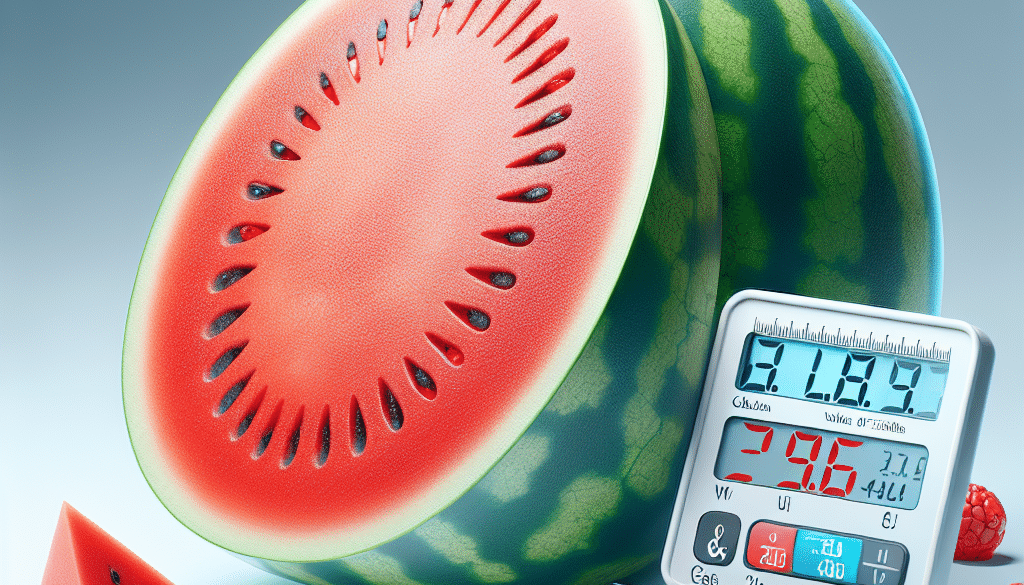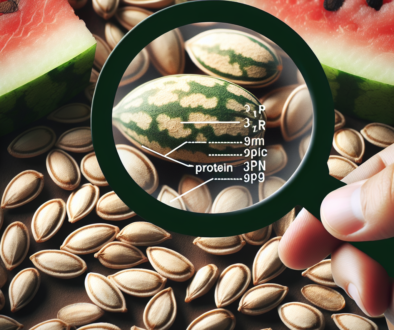Calories in a Large Watermelon: Counting the Cost
-
Table of Contents
Calories in a Large Watermelon: A Comprehensive Guide

Watermelon is a staple summer fruit that offers a refreshing taste and hydrating benefits. It’s a popular choice for picnics, barbecues, and as a healthy snack. But when it comes to calorie counting and managing dietary intake, understanding the caloric content of a large watermelon is essential. This article delves into the nutritional profile of watermelon, how to count the calories in a large watermelon, and the health benefits associated with its consumption.
Understanding Watermelon Nutrition
Watermelon is not only delicious but also packed with nutrients. It is low in calories and fat, and high in vitamins, minerals, and antioxidants. A standard serving of watermelon is about one cup of diced fruit, which contains approximately 30 to 50 calories. However, when dealing with a large watermelon, the calorie count can add up quickly.
- Vitamin C: Watermelon is an excellent source of Vitamin C, which is vital for immune system function and skin health.
- Vitamin A: Found in watermelon in the form of beta-carotene, Vitamin A is important for eye health and immune function.
- Potassium: This mineral helps to regulate fluid balance, muscle contractions, and nerve signals.
- Lycopene: Watermelon is rich in this powerful antioxidant, which has been linked to heart health and cancer prevention.
- Hydration: Watermelon is made up of about 92% water, making it a great option for staying hydrated.
Caloric Content of a Large Watermelon
When it comes to a large watermelon, which can weigh anywhere from 20 to 30 pounds (9 to 13.6 kilograms), the calorie count can vary significantly. On average, a large watermelon contains about 1,350 to 2,025 calories in total. To break this down further, we need to consider the edible portion of the watermelon.
Typically, around 70% of a watermelon’s total weight is the edible part. This means that a 20-pound watermelon would have about 14 pounds of edible fruit. Since there are approximately 46 calories per cup of diced watermelon, and there are roughly 9 cups of watermelon per pound, we can calculate the total caloric content.
Counting the Calories
Here’s a step-by-step guide to counting the calories in a large watermelon:
- First, weigh your large watermelon to determine its total weight.
- Calculate the weight of the edible portion (70% of the total weight).
- Convert the weight of the edible portion into cups (there are about 9 cups per pound).
- Multiply the number of cups by the average calories per cup (46 calories).
Using this method, a 20-pound watermelon would have approximately 14 pounds of edible fruit, which translates to 126 cups. Multiplying 126 cups by 46 calories per cup gives us a total of 5,796 calories for the entire edible portion.
Health Benefits of Watermelon
Despite its calorie content, watermelon offers numerous health benefits that make it a valuable addition to a balanced diet:
- Hydration: Its high water content helps to keep you hydrated, which is especially important during hot weather or after exercise.
- Weight Management: Watermelon has a high water and fiber content, which can help you feel full and reduce overall calorie intake.
- Heart Health: The antioxidants and amino acids in watermelon may contribute to heart health by improving blood flow and reducing blood pressure.
- Anti-inflammatory Properties: Lycopene and other compounds in watermelon have anti-inflammatory effects that may reduce the risk of chronic diseases.
- Workout Recovery: Watermelon contains citrulline, an amino acid that may help reduce muscle soreness after intense physical activity.
Conclusion: Balancing Enjoyment and Nutrition
While a large watermelon does contain a significant number of calories, it is also a nutrient-dense food that offers a variety of health benefits. By understanding the caloric content and incorporating watermelon into a balanced diet, you can enjoy this delicious fruit without compromising your nutritional goals. Remember to consume watermelon in moderation, especially if you are closely monitoring your calorie intake.
Discover ETprotein’s Watermelon Seed Protein
If you’re looking for a nutritious protein supplement, consider ETprotein’s watermelon seed protein. This product is derived from high-quality watermelon seeds, providing a plant-based protein option that’s perfect for vegans and those with dietary restrictions. ETprotein’s watermelon seed protein is an excellent choice for anyone looking to enhance their protein intake with a natural, non-GMO, and allergen-free product.
About ETprotein:
ETprotein, a reputable watermelon seed protein Chinese factory manufacturer and supplier, is renowned for producing, stocking, exporting, and delivering the highest quality organic bulk vegan protein and plant proteins. They include Organic rice protein, clear rice protein, pea protein, clear pea protein, watermelon seed protein, pumpkin seed protein, sunflower seed protein, mung bean protein, peanut protein etc. Their offerings, characterized by a neutral taste, non-GMO, allergen-free attributes, cater to a diverse range of industries. They serve nutraceutical, pharmaceutical, cosmeceutical, veterinary, as well as food and beverage finished product distributors, traders, and manufacturers across Europe, USA, Canada, Australia, Thailand, Japan, Korea, Brazil, and Chile, among others.
ETprotein specialization includes exporting and delivering tailor-made protein powder and finished nutritional supplements. Their extensive product range covers sectors like Food and Beverage, Sports Nutrition, Weight Management, Dietary Supplements, Health and Wellness Products, and Infant Formula, ensuring comprehensive solutions to meet all your protein needs.
As a trusted company by leading global food and beverage brands and Fortune 500 companies, ETprotein reinforces China’s reputation in the global arena. For more information or to sample their products, please contact them and email sales(at)ETprotein.com today.














